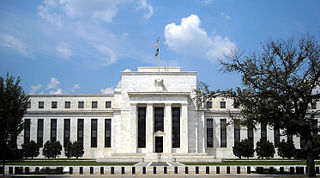 |
| Federal Reserve Board Building Photo credit: Wikipedia |
In the first article, Paul Krugman (Nobel-winning economist) and Larry Summers (former adviser to President Obama) debate whether the US is facing a "lost decade," or a long period of slow growth that doesn't quite count as a recession. Mr. Krugman believes we are, while Summers disagrees. I happen to agree with Summers. What do you think?
In the second piece, Bloomberg reveals that the Federal Reserve (the US central bank) lent out $7.7 trillion (with a 't') to beleaguered banks during the 2008 financial crisis. This is something that we're just learning about now, and it dwarfs the $770 billion Troubled Asset Relief Program (TARP) that became the focal point of the government's stimulus program.
Should the Fed have disclosed these loans earlier? Or should it have protected these banks from the stigma of failure that may have precipitated a run?
I believe the American people have the right to know about the decisions the Federal Reserve take. It is not correct for the Fed to have complete autonomy and be unaccountable to the American taxpayer. This article in which we lent out 7.7 trillion during the 2008 crisis shows how the Fed has, once again, stepped on American's heads and preferred to assist the big banks. That money could have helped assist Americans to pay their own debt. On top of that, the Fed lied to us and congress in denying access to the Fed books. At the very least, Congress should pass law to make the Fed be held accountable for its actions. This will bring automatic limitations on the Fed's future decisions, because of the public response and political backlash.
ReplyDeleteYou may be right about the backlash.
ReplyDeleteIt's tricky when it comes to individual banks. The FDIC stress tests banks every month to see how they fare, but they don't tell us how each one did because that might precipitate a run. If there's a run on the bank, that undermines the entire point on the FDIC.
On the other hand, the FDIC does at least tell us how many banks fail stress tests every month. Accordingly, there's no reason the Fed couldn't have made public information about the loans without naming banks. What's more, there's no reason why they had to wait this long.
One thing to note: hardly any of this money is taxpayer money.
Best,
Jesse-Douglas Mathewson